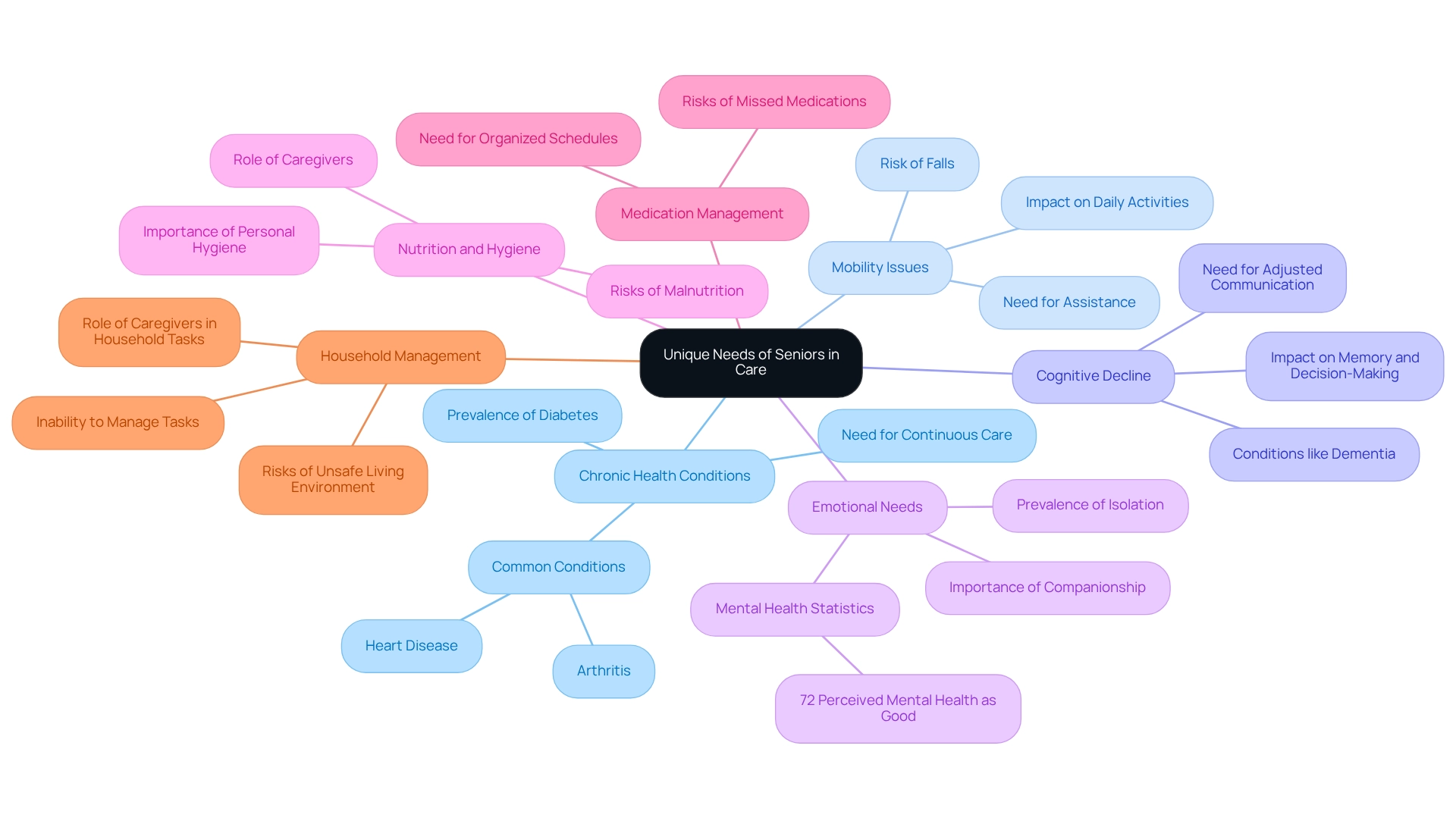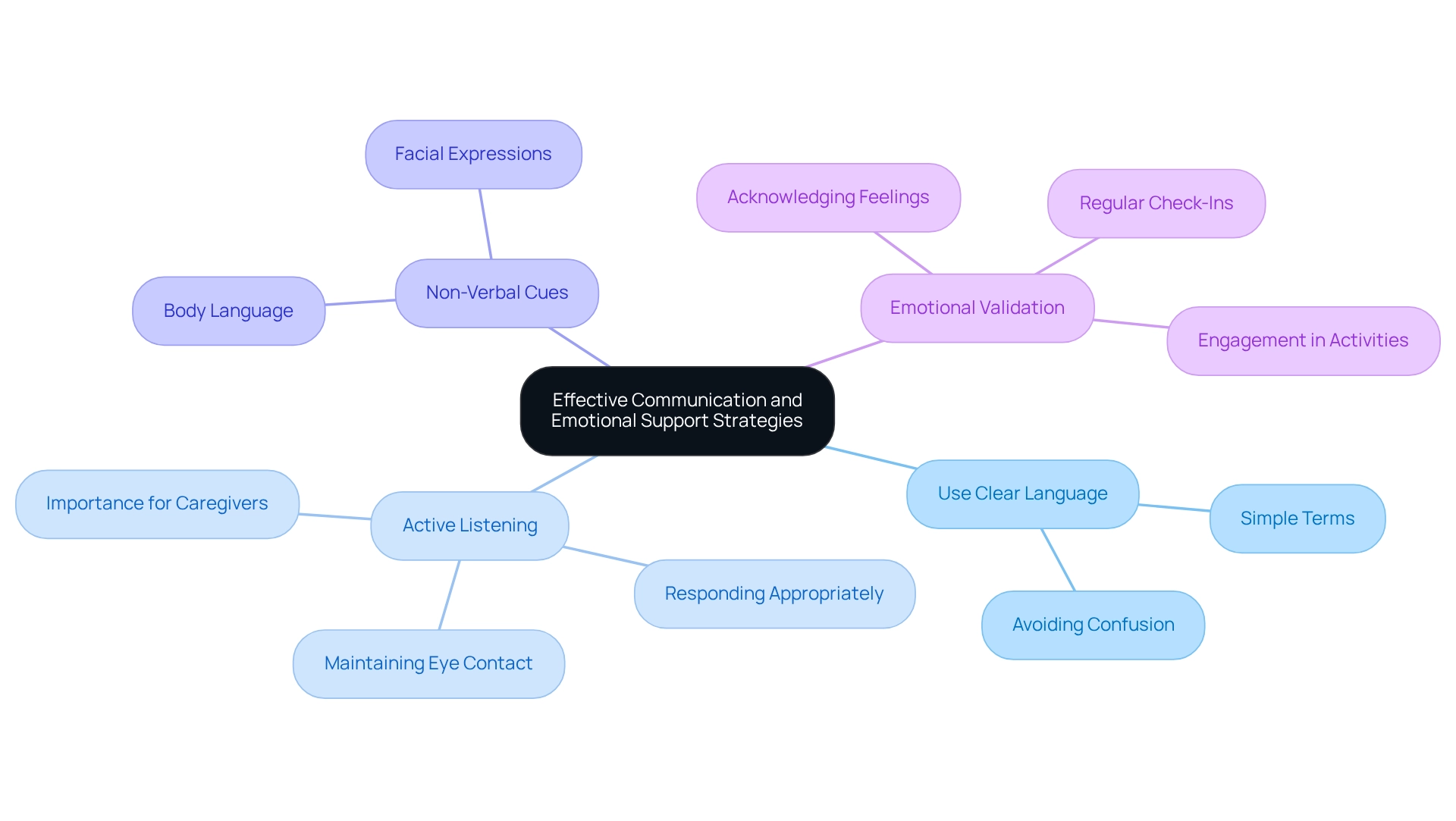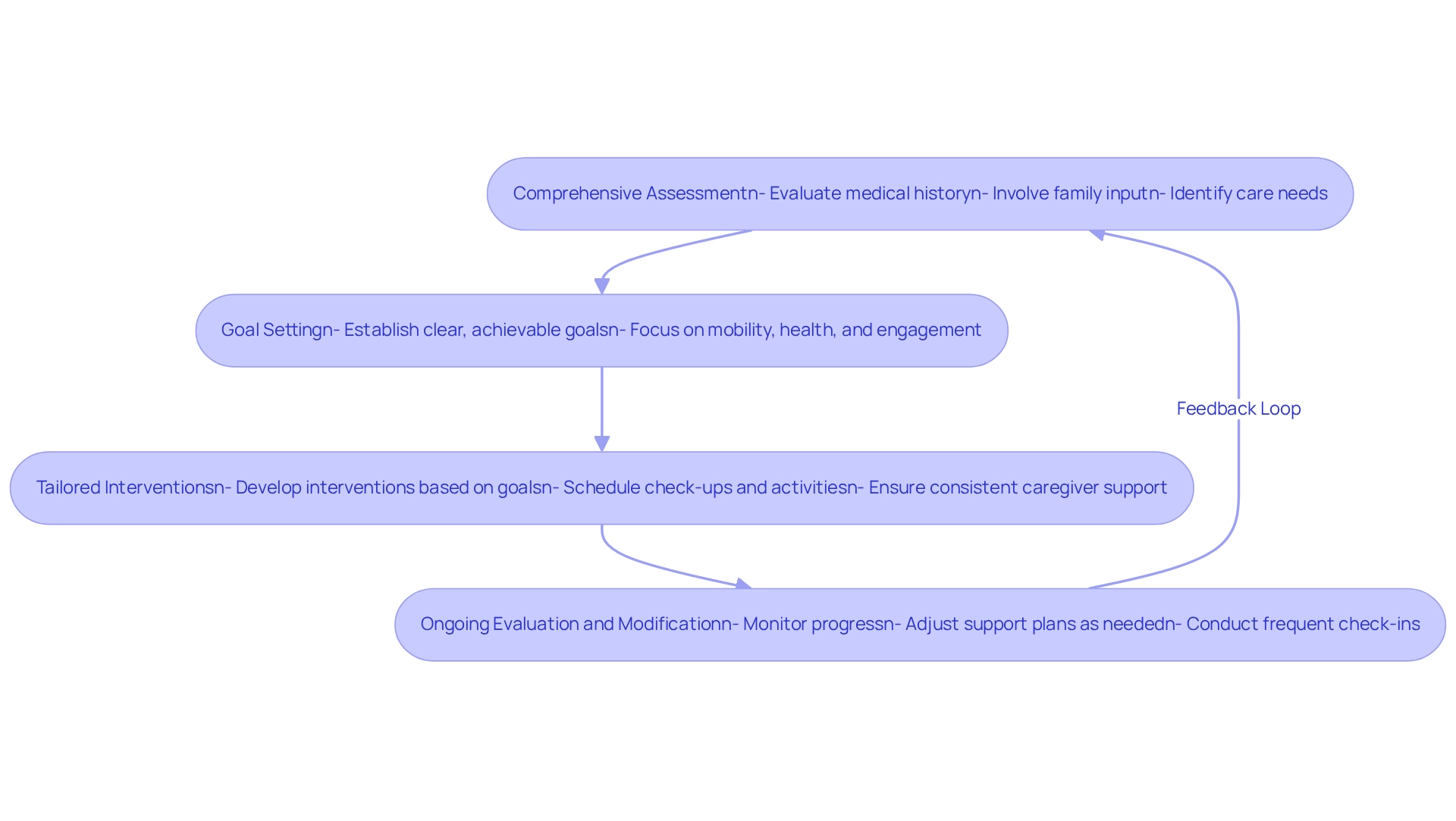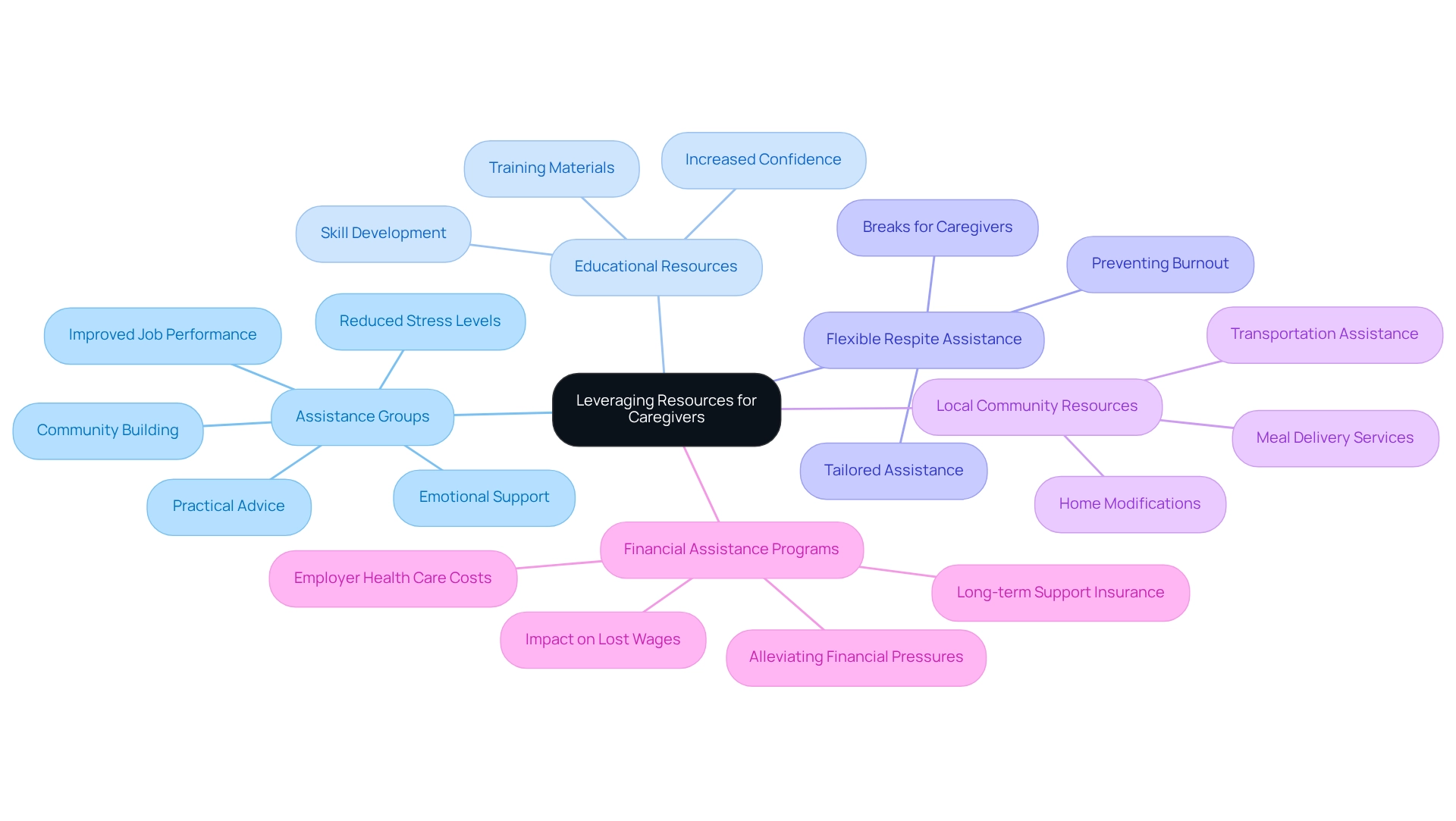Overview
The article highlights four essential strategies for providing effective aging care support.
- It emphasizes the importance of understanding the unique needs of seniors, recognizing that each individual has their own set of challenges and experiences.
- Next, it discusses the implementation of effective communication and emotional support strategies, which are crucial for fostering trust and connection.
- Additionally, developing personalized care plans ensures that each senior receives tailored support that addresses their specific health conditions and emotional well-being.
- Finally, leveraging resources for caregivers not only enhances their ability to provide care but also promotes a supportive environment for both caregivers and seniors.
Each of these strategies plays a vital role in managing chronic health conditions and enhancing the overall quality of life for elderly individuals. By focusing on these critical aspects, we can promote better health outcomes and ensure that our seniors feel valued and supported. Remember, your comfort is our priority, and we’re here for you every step of the way.
Introduction
As the population of seniors continues to grow, understanding their unique needs becomes increasingly vital for ensuring their well-being. Seniors face a myriad of challenges, from chronic health conditions and mobility issues to emotional distress and cognitive decline. These factors not only complicate daily life but also necessitate tailored care strategies that address their specific requirements.
Effective communication, personalized care plans, and robust support systems are crucial components in delivering compassionate and effective care. By recognizing and addressing these diverse needs, caregivers can significantly enhance the quality of life for seniors, fostering independence and dignity in their golden years. We’re here for you, ensuring that your comfort is our priority as we navigate these challenges together.
Understand the Unique Needs of Seniors in Care
Seniors encounter a range of unique challenges that significantly affect their overall well-being, making aging care essential. These challenges include physical limitations, cognitive decline, and emotional distress, which can complicate their daily lives and highlight the need for effective aging care. Let’s explore some key issues that many seniors face:
- Chronic Health Conditions: A substantial number of seniors manage chronic illnesses such as diabetes, heart disease, and arthritis, necessitating continuous care and support. As we look ahead to 2025, the prevalence of these conditions remains a pressing concern. Many older adults require tailored strategies for aging care to maintain their health. Significantly, diabetes—especially type 2—is common among older adults, with adjustable risk factors like obesity and lack of physical activity. Without adequate aging care support services, chronic conditions may deteriorate, and new health issues may remain unnoticed or untreated, leading to considerable health declines.
- Mobility Issues: Physical limitations often hinder older adults’ ability to carry out daily activities independently. This can create a need for aging care assistance with movement and personal support, underscoring the significance of caregivers who can offer essential help. Restricted mobility can elevate the likelihood of falls and associated injuries, which are frequent and often severe for older adults.
- Cognitive Decline: Conditions like dementia and Alzheimer’s disease can severely impact memory and decision-making abilities. Care providers must adjust their communication and support techniques in aging care to address the changing requirements of elderly individuals facing cognitive difficulties. The emotional assistance offered by caregivers in aging care can alleviate feelings of loneliness and depression, contributing to better mental health outcomes.
- Emotional Needs: Isolation and sadness are prevalent among the elderly, making emotional support and companionship vital elements of effective care. In fact, a study indicated that in 2017–2018, about 72.0% of older adults perceived their mental health as very good or excellent, which emphasizes the need for effective aging care. Programs that focus on fostering social connections can significantly improve mental health outcomes. Without companionship and support, older adults can become socially isolated, leading to further emotional distress.
- Nutrition and Hygiene: Poor nutrition and hygiene can lead to serious health complications. Lack of assistance with meal preparation can result in malnutrition, while difficulties in maintaining personal hygiene can lead to infections. Caregivers play a crucial role in aging care by ensuring that elderly individuals receive proper nutrition and maintain their hygiene, which is vital for their overall health.
- Medication Management: Missed or incorrectly administered medications can lead to adverse health effects and complications. In the context of aging care, caregivers assist in organizing medication schedules, ensuring that elderly individuals take their prescriptions as directed, which is crucial for managing chronic conditions.
- Household Management: The inability to manage household tasks can create an unsafe living environment, increasing the risk of accidents. Caregivers assist with housekeeping, laundry, and various tasks as part of providing aging care, which helps establish a safe and organized environment for elderly individuals.
By conducting thorough evaluations of these needs, providers can implement aging care strategies that promote independence and enhance the quality of life for elderly individuals. For instance, programs aimed at chronic disease self-management have proven effective in helping older adults navigate their health challenges, ultimately leading to better health outcomes. The case study titled “Impact of Chronic Conditions on Older Adults” illustrates how such programs provide low-cost solutions to help individuals learn to manage their conditions effectively. Understanding these unique needs is crucial for delivering compassionate and effective aging care. Remember, we’re here for you, and your comfort is our priority.

Implement Effective Communication and Emotional Support Strategies
To promote effective communication with older adults, support providers should implement strategies that enhance understanding and emotional connection.
-
Use Clear Language: Employ simple, direct terms to avoid confusion, ensuring older individuals can easily comprehend vital information. As our elderly population grows, the importance of clear communication in aging care becomes even more crucial, especially when evaluating the need for CNA or HHA support services.
-
Active Listening: Show genuine interest in older adults’ thoughts and feelings by maintaining eye contact, nodding, and responding appropriately to their concerns. This approach is essential, as studies indicate that 80 percent of adults over 60 struggle with understanding complex documents. Caregivers, whether CNAs or HHAs, play a vital role in keeping family members informed about the elder’s condition, making active listening even more important.
-
Non-Verbal Cues: Pay attention to body language and facial expressions, which can significantly convey empathy and understanding. This reinforces the emotional bond between caregiver and elder, alleviating feelings of isolation and ensuring that older adults feel supported in their daily activities.
-
Emotional Validation: Acknowledge and validate the feelings of older individuals, whether they express joy, sadness, or frustration. This practice fosters a sense of support and understanding, essential for their emotional well-being. Regular check-ins with elderly individuals to discuss their experiences and concerns are vital to meeting their emotional needs in the context of aging care. Engagement in activities encourages participation in social and recreational opportunities that promote emotional health and mitigate feelings of isolation. Involving older adults in meaningful activities can significantly enhance their quality of life and emotional strength, which is a crucial element of the individualized support that Best Care Nurses Registry strives to offer.
By applying these strategies, providers can foster stronger connections with older individuals, creating a nurturing atmosphere that greatly enhances the overall support experience. However, caregivers should remain vigilant against common pitfalls, such as assuming older adults understand complex information or neglecting to validate their emotions, as these can hinder effective communication. As the elder support sector continues to evolve, embracing these strategies will be essential in ensuring that older individuals receive the compassionate and effective assistance they deserve.

Develop Personalized Care Plans for Individual Needs
Developing customized care plans for elderly individuals is crucial for providing effective and compassionate support. The process involves several key steps:
-
Comprehensive Assessment: Begin with a detailed evaluation of the senior’s medical history, current health status, and personal preferences. This assessment should actively involve input from both the senior and their family members, ensuring a holistic understanding of their needs. Indicators suggesting the need for CNA/HHA caregiver services include difficulty with personal hygiene, dressing, cooking, cleaning, or managing medications. Health issues like managing chronic conditions, frequent hospital visits, or recent surgeries that necessitate continual attention are also significant factors. CNAs (Certified Nursing Assistants) usually undergo more comprehensive training centered on medical duties, whereas HHAs (Home Health Aides) emphasize personal support and daily living tasks. This distinction is crucial for families assessing care options. Additionally, the alarming rates of elder abuse, with about 1 in 6 people aged 60 years or older experiencing such abuse globally, highlight the need for tailored support to safeguard vulnerable populations.
-
Goal Setting: Establish clear and achievable goals that resonate with the senior’s desires and requirements. These goals may encompass improving mobility, managing chronic conditions, or enhancing social engagement, all of which contribute to a better quality of life.
-
Tailored Interventions: Develop interventions that align with the established goals. This could include scheduling regular medical check-ups, arranging physical therapy sessions, or facilitating social activities that promote interaction and well-being. As one helper shared, “I asked for one assistant.” They’ve sent me twelve different individuals, emphasizing the significance of consistency in support staff assignments to foster trust and comfort. Keeping transparent communication with the caregiver and the home support agency is essential for ensuring quality assistance. Furthermore, home health services are often more cost-effective and convenient than treatment in a hospital or nursing facility, making it an appealing option for families.
-
Ongoing Evaluation and Modification: Continuously observe the elder’s progress and make necessary changes to the support plan. Frequent check-ins are essential for recognizing any alterations in health condition or preferences, guaranteeing that the support offered stays pertinent and effective.
Focusing on individualized support plans not only enhances the quality of assistance for seniors but also promotes a sense of autonomy and dignity, which is essential for their overall well-being. With almost 5.6 million senior citizens residing beneath the poverty threshold in 2022, the demand for customized assistance is more urgent than ever, emphasizing the significance of thorough evaluations in elder services. Upcoming articles will also focus on perspectives of those providing care, contributing to a more balanced view of home care experiences.

Leverage Resources and Support Systems for Caregivers
Providers can greatly enhance their caregiving experience by tapping into a variety of resources and assistance systems that truly make a difference:
- Assistance Groups: Joining provider assistance groups offers not just emotional support, but also practical advice and a nurturing community. Sharing experiences with others who face similar challenges can alleviate feelings of isolation and foster resilience. Research indicates that those who engage in these supportive networks report improved job performance and reduced stress levels, highlighting the importance of these groups.
- Educational Resources: Accessing training and educational materials equips individuals with the essential skills needed to manage specific challenges, such as operating medical equipment or understanding chronic conditions. These resources can lead to enhanced efficiency and confidence for support providers.
- Flexible Respite Assistance Services: Utilizing respite services allows caregivers to take necessary breaks, significantly reducing stress and preventing burnout. Best Care Nurses Registry offers tailored assistance, with professionals available for just a few hours each day or around the clock, ensuring that caregivers can find the right balance for their needs. This flexibility is crucial for maintaining long-term caregiving capacity.
- Local Community Resources: Many communities provide valuable services such as meal delivery, transportation assistance, and home modifications that can ease the caregiving burden. These resources not only assist those who provide support but also enhance the quality of life for seniors.
- Financial Assistance Programs: Exploring financial aid options, such as long-term support insurance, can help alleviate the financial pressures associated with providing assistance. Best Care Nurses Registry accepts most long-term support insurances directly, allowing providers to focus on delivering care without the immediate concern of payment. This is especially significant, as lost wages for women who leave the workforce early due to caregiving responsibilities can total $142,693. Moreover, workers with caregiving duties incur their employers an estimated 8% more in health care expenses, which amounts to an additional $13.4 billion annually, underscoring the financial implications of aging care. By embracing these resources, those engaged in aging care can enhance their own well-being while delivering high-quality support to seniors, ultimately leading to improved outcomes for everyone involved. The impact of educational materials and assistance groups is profound, as research shows that individuals who engage in networking report enhanced job performance and reduced stress levels. Furthermore, two-thirds of caregivers support additional policies that prevent workplace discrimination against employees with caregiving responsibilities, emphasizing the ongoing need for community and workplace support.

Conclusion
Seniors encounter a range of unique challenges that profoundly affect their well-being, such as chronic health conditions, mobility issues, cognitive decline, emotional distress, and difficulties with nutrition and hygiene. Addressing these challenges calls for a comprehensive approach that emphasizes effective communication, personalized care plans, and robust support systems. By understanding and assessing the specific needs of seniors, caregivers can implement tailored strategies that promote independence and enhance their quality of life.
Effective communication plays a vital role in nurturing emotional connections between caregivers and seniors. By utilizing clear language, active listening, and emotional validation, interactions can significantly improve, supporting emotional well-being. Furthermore, creating personalized care plans that involve comprehensive assessments and tailored interventions ensures that seniors receive the appropriate care suited to their individual circumstances. Regular reviews and adjustments to these plans further enhance their effectiveness, fostering a sense of autonomy and dignity for seniors.
Caregivers should also leverage available resources and support systems to enrich their caregiving experience. Engaging in support groups, accessing educational resources, utilizing respite care, and exploring financial assistance programs can alleviate the burdens of caregiving. By prioritizing their own well-being, caregivers can provide higher-quality care for seniors, ultimately leading to better health outcomes for both parties.
In conclusion, recognizing the unique needs of seniors and implementing compassionate, tailored care strategies is essential for enhancing their quality of life. By fostering strong caregiver-senior relationships, developing personalized care plans, and utilizing available resources, caregivers can play a pivotal role in ensuring that seniors lead fulfilling, dignified lives during their golden years. Remember, we’re here for you, and your comfort is our priority.
Frequently Asked Questions
What unique challenges do seniors face that affect their well-being?
Seniors encounter challenges such as chronic health conditions, mobility issues, cognitive decline, emotional needs, nutrition and hygiene concerns, medication management, and household management, all of which significantly impact their daily lives and overall well-being.
What are some common chronic health conditions among seniors?
Common chronic health conditions among seniors include diabetes, heart disease, and arthritis. These conditions require continuous care and support, and managing them effectively is essential for maintaining health.
How do mobility issues affect older adults?
Mobility issues can hinder older adults’ ability to perform daily activities independently, increasing the risk of falls and injuries. This highlights the need for aging care assistance to provide support with movement and personal tasks.
What is the impact of cognitive decline on seniors?
Cognitive decline, including conditions like dementia and Alzheimer’s disease, can severely affect memory and decision-making abilities. Care providers must adapt their communication and support techniques to meet the needs of seniors facing these challenges.
Why is emotional support important for older adults?
Emotional support is crucial as many seniors experience isolation and sadness. Companionship and social connections can significantly improve mental health outcomes, reducing feelings of loneliness and depression.
How can poor nutrition and hygiene impact seniors?
Poor nutrition can lead to malnutrition, while inadequate hygiene can result in infections. Caregivers play a vital role in ensuring that elderly individuals receive proper nutrition and maintain their hygiene for overall health.
What role does medication management play in aging care?
Medication management is essential as missed or incorrectly administered medications can cause adverse health effects. Caregivers assist in organizing medication schedules to ensure elderly individuals take their prescriptions as directed.
How does household management relate to aging care?
Seniors who cannot manage household tasks may create unsafe living environments, increasing accident risks. Caregivers help with housekeeping and other tasks to maintain a safe and organized environment for elderly individuals.
What strategies can enhance the quality of life for seniors?
Implementing aging care strategies that promote independence, such as chronic disease self-management programs, can help seniors navigate health challenges and improve their overall quality of life.
Why is understanding the unique needs of seniors important in aging care?
Understanding the unique needs of seniors is crucial for delivering compassionate and effective aging care, ensuring that their specific challenges are addressed to enhance their well-being and comfort.











